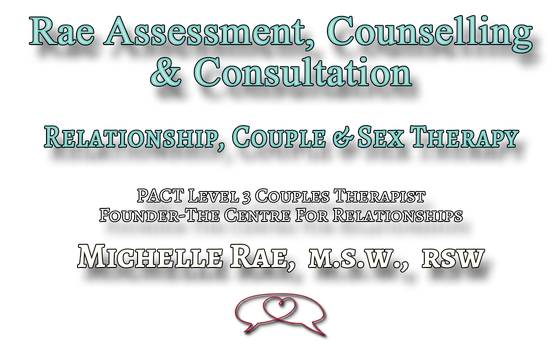Click on Service Titles for details
Relationship Counselling

People seek out relationship therapy for a variety of reasons, often with the hope of improving their life and/or their relationships. This often comes from a desire to have a sense of peace, calm and happiness in ones life and relationships, both personally and professionally. Although I work primarily from an attachment theory approach, I draw upon many different treatment modalities to assess and work with my clients with the following needs/concerns:
- Premarital Counselling
- Coping with Infidelity
- Coping with separation/divorce
- Developing Relational self awareness, Understanding attachment styles and how they inform how we show up in relationships
- Interpersonal relationship concerns/struggles
- Infertility issues
- Addiction issues
- Intimacy issues
- Life transitions
- Sex and sexuality
- Inner Child work
Couples / Marital Counselling

Our intimate, partner relationships are often among the most important in our lives. When we feel emotionally and physically connected to our partners, we often feel at peace, contented and happy. But for a variety of reasons, our intimate relationships can become challenged, which can lead to feeling emotionally disconnected and adrift from our significant other(s), often causing difficulties with communication and relationship satisfaction. Quality couples therapy can assist partners in identifying the underlying emotional upsets and/or injuries that are making it difficult for the couple to connect in a meaningful and desired way and repair those injuries, so that the relationship is able to heal and grow.
- Difficulties with communication patterns
- Conflict resolution
- Transitional Life stages
- Parenting
- Infidelity
- Mental/Physical illness
- Emotional and Physical Intimacy
- Separation
- Work Stress
- Family of Origin concerns
- Conscious uncoupling
- Ethical non-monogamy
Sex Therapy

WHAT IS SEX THERAPY?
Sex Therapy involves a range of therapeutic processes and exercises which can be used to initiate, to restore and to enrich both the individual's sexuality and/or the sexual components of an intimate relationship.
Sex therapy is based on the guiding belief that:
Sex therapy takes place in a supportive atmosphere in which couples or individuals can talk about their sexual, emotional and relationship issues with a specially trained professional who is knowledgeable and comfortable with human sexuality.
Individuals and couples often encounter sexual problems and concerns at various times in their intimate relationships. Registered Sex Therapists have academic, clinical and supervised training and experience in sexual matters and in their treatment.
Sex Therapy helps people learn more about their body and feel at ease with the range of sexual feelings. Developing physical, sexual, mental, psychological, emotional and spiritual well being contributes to a healthy sexual functioning. Many people feel uninformed about how sexual responses can affect the enjoyment of sex.
Sexual Intimacy is more than physical sex. Sexual intimacy strengthens the closeness and caring bond between partners. Sexual intimacy is about being comfortable making sexual requests. This is especially important in today's pressured society. Dissatisfaction with the sexual aspects of a couple's relationship and the loss of shared intimacy and trust may lead to feelings which threaten the total relationship.
Sex Therapy involves a range of therapeutic processes and exercises which can be used to initiate, to restore and to enrich both the individual's sexuality and/or the sexual components of an intimate relationship.
Sex therapy is based on the guiding belief that:
- sexuality can be a healthy, positive and rewarding part of life.
- emotional & physical intimacy are desirable goals.
Sex therapy takes place in a supportive atmosphere in which couples or individuals can talk about their sexual, emotional and relationship issues with a specially trained professional who is knowledgeable and comfortable with human sexuality.
Individuals and couples often encounter sexual problems and concerns at various times in their intimate relationships. Registered Sex Therapists have academic, clinical and supervised training and experience in sexual matters and in their treatment.
Sex Therapy helps people learn more about their body and feel at ease with the range of sexual feelings. Developing physical, sexual, mental, psychological, emotional and spiritual well being contributes to a healthy sexual functioning. Many people feel uninformed about how sexual responses can affect the enjoyment of sex.
Sexual Intimacy is more than physical sex. Sexual intimacy strengthens the closeness and caring bond between partners. Sexual intimacy is about being comfortable making sexual requests. This is especially important in today's pressured society. Dissatisfaction with the sexual aspects of a couple's relationship and the loss of shared intimacy and trust may lead to feelings which threaten the total relationship.
|
WHO SEEKS SEX THERAPY?
Heterosexual, gay, lesbian, bisexual and transgendered individuals are counselled by Registered Sex Therapists for concerns which include:
Sex Therapists facilitate a person's ability to be creative in reaching his or her sexual potential. |
SEX THERAPY IS APPROPRIATE FOR:
A QUALIFIED SEX THERAPIST:
|
Pact Therapy (Psychobiological Approach to Couples Therapy)

WHAT IS PACT THERAPY?
Michelle is a Relationship and Intimacy expert who works with couples and partners from the PACT model of therapy. She has studied under Stan Tatkin, PsyD, MFT (founder and developer of The PACT Model & Institute), and continues to receive and participate in ongoing professional development and clinical supervision with Stan Tatkin and the PACT community.
According to The PACT Institute website (www.thepactinstitute.com), PACT was developed out of exciting, cutting-edge research in three areas:
The first is neuroscience, the study of the human brain. Understanding how the brain works provides a physiological basis for understanding how people act and react within relationships. In a nutshell, some areas of your brain are wired to reduce threat and danger and seek security, while others are geared to establish mutuality and loving connection.
The second is attachment theory, which explains the biological need to bond with others. Experiences in early relationships create a blueprint that informs the sense of safety and security you bring to adult relationships. Insecurities that have been carried through life can wreak havoc for a couple if these issues are not resolved.
The third area is the biology of human arousal—meaning the moment-to-moment ability to manage one’s energy, alertness, and readiness to engage.
It isn’t necessary to understand the scientific basis of PACT to realize its benefits. What does a PACT session look like? Your experience during a PACT session may differ somewhat from what you would experience in other forms of couples therapy. Key features of this approach include:
Michelle is a Relationship and Intimacy expert who works with couples and partners from the PACT model of therapy. She has studied under Stan Tatkin, PsyD, MFT (founder and developer of The PACT Model & Institute), and continues to receive and participate in ongoing professional development and clinical supervision with Stan Tatkin and the PACT community.
According to The PACT Institute website (www.thepactinstitute.com), PACT was developed out of exciting, cutting-edge research in three areas:
The first is neuroscience, the study of the human brain. Understanding how the brain works provides a physiological basis for understanding how people act and react within relationships. In a nutshell, some areas of your brain are wired to reduce threat and danger and seek security, while others are geared to establish mutuality and loving connection.
The second is attachment theory, which explains the biological need to bond with others. Experiences in early relationships create a blueprint that informs the sense of safety and security you bring to adult relationships. Insecurities that have been carried through life can wreak havoc for a couple if these issues are not resolved.
The third area is the biology of human arousal—meaning the moment-to-moment ability to manage one’s energy, alertness, and readiness to engage.
It isn’t necessary to understand the scientific basis of PACT to realize its benefits. What does a PACT session look like? Your experience during a PACT session may differ somewhat from what you would experience in other forms of couples therapy. Key features of this approach include:
- Your therapist will focus on moment-to-moment shifts in your face, body, and voice, and ask you to pay close attention to these as a couple.
- Your therapist will create experiences similar to those troubling your relationship and help you work through them in real time during the session.
- PACT tends to require fewer sessions than do other forms of couple therapy.
- PACT sessions often exceed the 50-min hour and may last as long as 3–6 hours. Longer times allow for the in-depth work of PACT.
- Your therapist may videotape sessions to provide immediate feedback to you.
Forms
Forms are necessary to get your contact information and consent prior to your first session. (Click button to download)
Please print off and bring completed forms to the first appointment.
Please print off and bring completed forms to the first appointment.
Fees
This is a private service and not covered under OHIP. You may receive full or partial reimbursement through extended health benefits where coverage exists. It is highly recommended that you contact your provider to determine your coverage.
Referrals
Referrals are accepted directly from the client or from Physicians, Lawyers, Hospitals and Community Agencies.
Cancellation Policy
Please note, cancelled sessions with less than 2 business days notice will be billed at the regular rate, regardless of the reason.

